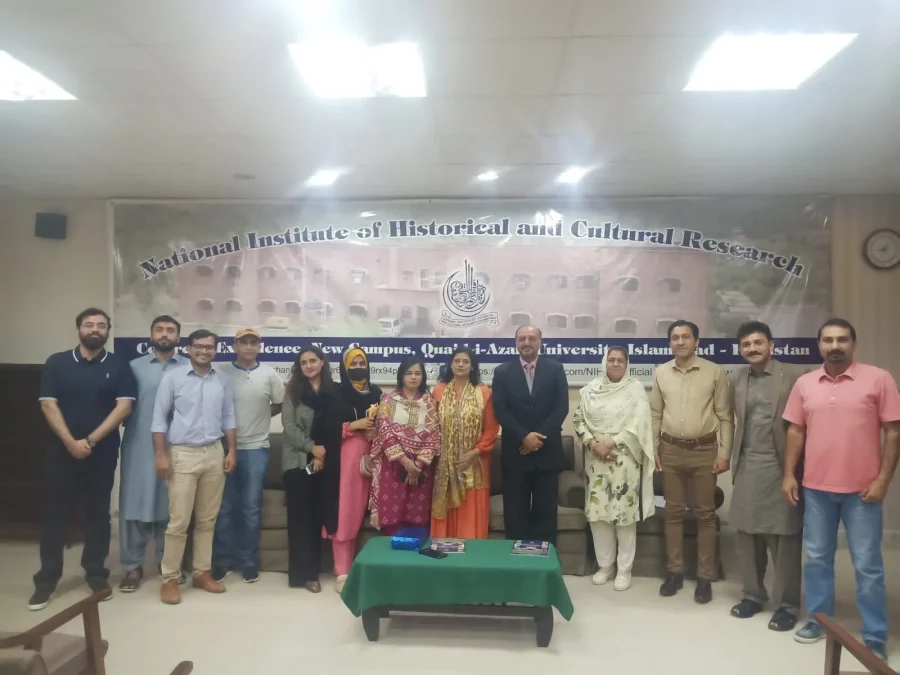National Institute of Historical and Cultural Research, Centre of Excellence Quaid-i-Azam University Islamabad Organized a seminar on “Dismantling Sexism: Exploring Derogatory Proverbs and Negative Female Representation in History and Culture” which was attended by the faculty member, students and research scholars of Social Science as well as Natural Sciences departments of QAU. The seminar started with the recitation of the Holy Quran.
In the opening remarks Dr. Rahat Zubair Malik hinted about the significance of the month of March for raising voice for the rights of women and celebration of International Women’s Day. She hinted that being a Muslim Society, we have a comprehensive value system where every day is women’s day as we respect and love females as Mothers, Sisters, and Daughters. But still there are certain points that need to be focused as we need to learn which expressions are derogatory and must not be used. The guest Speaker Ms. Sadaf Mirza a distinguished scholar in Danish literature with significant contributions to the understanding and analysis of Danish history, language, and literature, as well as the translation and interpretation of various literary works gave her presidential address. She discussed the method to study feminism and traced the origin of the proverbs back to Mesopotamian civilization and highlighted that the history of derogatory proverbs for women is as old as the human civilization. She further discussed that first traces of derogatory proverbs about women can be traced back to ‘Epic of Gilgamesh’ which was found on clay tablets. Although it was a challenge to decipher the language but after getting it deciphered, we came to know that the concept of ‘Good Woman’ and concept of ‘Bad Woman’ was first given in the Epic of Gilgamesh. Through Hellen of Troy, we come to know that during that period women were only considered to keep and grow the seed of men for the growth of generations. In the Greek Mythology the god Zeus who was the god of sky and thunder in ancient Greek religion and mythology, who ruled as king of the gods on Mount Olympus even used the rape women against their will and used to keep them imprisoned.
In proverbs the beautiful women have always been criticized in the proverbs such as ‘Beautiful women are always cursed’. She highlighted that Italian and German Scholars studied some Sindhi proverbs and when compared these with the proverbs in European language about the women were found equally derogatory. She said there are almost 350 Urdu proverbs that are derogatory about women and their translation or similar meaning proverbs in English language are available with equally derogatory stance. In European Culture the term was used to ‘Keep her barefooted; keep her pregnant’. Similar proverbs can be found in every language. Few examples of proverbs and their translations are as; ‘Wehli Run Shetan Da Charkha’ meaning An idle wife is just a satanic machine; another proverb ‘Sundar Naar, Choor Dwar, Ghar Waly ko Kry Khwar’ means a beautiful woman and a backdoor ruins a man’s wealth; ‘Bhair ki Laat kya, Aurat ki Zaat Kya’ . She quoted multiple such proverbs.
While discussing about the ‘Aurat March’ she explained that the history of women march goes back to Buddha when the women were degraded and were not allowed to attend monasteries. At that Mother of Buddha marched for 200 miles and reached monastery to perform religious rituals. She said that women body is not a hurdle, but it is made a hurdle to insult her, to keep her backward or keep her dependent. She also discussed the negative attitude of certain societies and considering them impure during their biological cycle and after the birth of child. She discussed certain slogans for women rights and stated that all that is required to bring change in the society is to communicate our opinion positively. She said that feminism that is being discussed is not the issue of majority of our society. All that is needed is to understand the power of language and its appropriate usage to make women’s point of view understood in society. Dr. Naveed Kausar Janjua a distinguished chemistry professor also commented on the occasion and said that women’s rights can only be protected if they are discussed in a manner that is acceptable to our social norms. In the end Director NIHCR, Dr. Sajid Mahmood Awan concluded the discussion with a vote of thanks and stated expressed the significance of understanding the power of language and power of expression. He stated that we need to learn to give respect to the ladies of our society, which is the only way of development and positive social growth. He said that the slogans like my body, my choice are one of the expressions of post-colonial discourse which we need to comprehend from the grassroot level to understand the problems being faced by women of our society.










